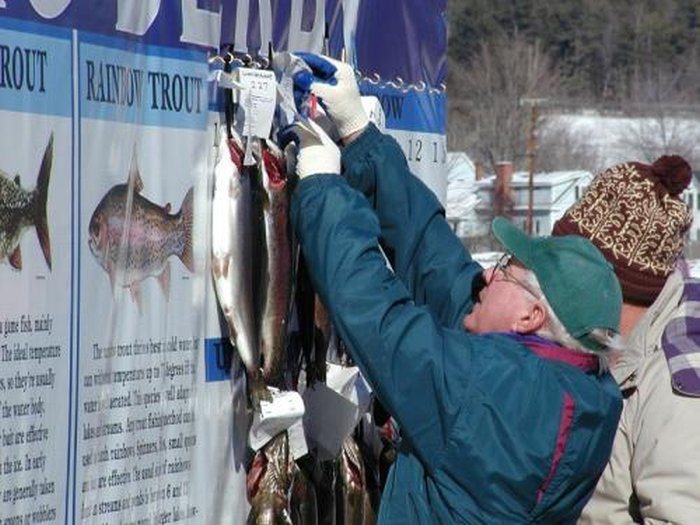(Photo: NH1.com/AP)
Judge’s job is to keep ice fishermen in line
By Michael Matza
MEREDITH, N.H. With lake-effect winds slamming temperatures below zero, Steve Bennett's ungloved hands seem immune to the cold. Like a virtuoso on a Stradivarius, Bennett sends his purple fingers playing the surface of the swollen fish bellies, massaging, caressing, coaxing their secrets.
As top judge in the richest ice-fishing tournament in New England, Bennett, an ichthyologist, probes for D-cell batteries, lug nuts, sinkers, washers and any other junk that prize-seekers have used to add weight to their catch.
A former state policeman who now works in bank security, Bennett has the authority to slit open any fish or have it X-rayed at a nearby veterinarian's office. But that's not his style. Instead, this bearish figure in a forest-green parka, gold wire-rimmed glasses and yellow snow pants mixes knowledge of fish forensics and human nature to detect frauds with simple questions about how and where a fish was taken.
If a fisherman is flimflamming, he'll telegraph it, says the expert on fishy fish: "The eyes are the window on the soul." What the angler's eyes do not disclose, Bennett's sensitive fingers generally will.
(Photo: LakeWinnipesaukee.info)
With $41,000 in prizes, the Great Rotary Fishing Derby, now in its 16th year, draws contestants from Montana, Kentucky, Delaware, Florida and Maryland. Anglers swathed in layers of down and booted like moon-walkers bore holes into frozen Lake Winnipesaukee and smaller freshwater bodies throughout New Hampshire to fish for rainbow trout, pickerel, lake trout, yellow- and white-tail perch and cusk.
Although traditionalists cut holes by hand, those who'd rather not sweat use gasoline-powered augers to screw through 20 inches of ice in seconds. Cross-shaped traps attached to fishing lines are set across the pie plate-sized holes. The tugging of a fish on the line triggers a spring-loaded orange flag attached to the top of the trap. A "tip-up" generally means a bite, although false alarms can be caused by the rumble of ubiquitous snowmobiles.
Tiny "bob houses," sometimes heated with potbelly stoves and illuminated with the electrical power from car batteries, are dragged onto the ice to provide a sheltered place to cook a venison stew, dodge wind chills that averaged minus 20 degrees on Sunday, quaff blackberry brandy and down a chilly Budweiser. Or two. Or five.
Cash prizes of $60 to $1,000 are awarded for the heaviest fish in each category, and prize catches are hung from a board to be admired as they freeze stiff. The grand prize a boat, motor and trailer worth $15,500 goes to the person who catches the largest rainbow trout stocked by the Rotary's fish replenishment program, their dorsal fins tagged with the club's distinctive iridescent blue wire.
Of more than 5,000 entrants each year, only a few try to cheat. Yet finagling in the cold is an ice-fishing tradition, and each year it seems at least one person tries it. "Ninety-nine percent of the sportsmen are the greatest thing in the world," says Meredith Police Chief John Curran.
One percent make life interesting. Like the time Curran impounded the grand prize and conducted an investigation after allegations that the winning fish came from an off-limits lake. After a two-year civil court battle, the 1992 winner was disqualified and the boat went to the fisherman in second place. Then there was the time a couple of years ago that Bennett ran his fingers along a big-mouthed old cusk and just knew he was feeling batteries. Because of its huge mouth, long body and enormous belly, the ugly cusk is a scammer's delight.
"Fish, fish, fish, battery, fish, battery, fish," Bennett remembers thinking as he slid his fingertips along the length of the slimy, mottled-brown belly. When Bennett asked the fisherman to sign an affidavit stating the fish was legal, the guy took off on a run. Bennett opened the fish and found the two D-cell powerplants.
True to tradition, this year's derby brought another hustle. This time a slithery cusk was crammed with a huge baitfish much too big for it to have swallowed on its own, Bennett thought. Inside the bait three inches of which protruded from the cusk's mouth was a hook, a tangle of fishing line and a heavy, quarter-sized washer.
"Baitfish don't swallow sinkers," Bennett informed the contestant as he promptly disqualified the fish. The irate fisherman shredded his derby ticket into pieces and threw confetti at the judge. "Well, you have a nice day too," Bennett gibed.
As the local radio station interrupted Dick Clark's "Rock, Roll and Remember" show to broadcast a live update from the tournament, Rotarian Craig Moriarty, a Meredith real estate broker, hung another "money" fish on the board. Frozen blood, slime and fish roe clung to Moriarity's beige ski gloves. "What do you do with those gloves when the derby's over?" someone asked.
"Put 'em in a bag until next year," said Moriarity. "And keep 'em away from the cats."
—The Philadelphia Inquirer, Feb. 15, 1995


